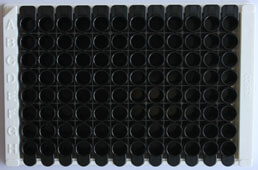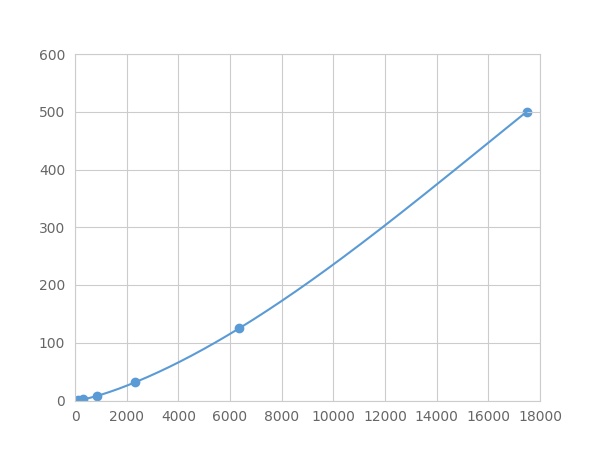Packages (Simulation)

Reagent Preparation

Image (I)
Image (II)
Certificate


Multiplex Assay Kit for Macrophage Inflammatory Protein 1 Alpha (MIP1a) ,etc. by FLIA (Flow Luminescence Immunoassay)
CCL3; MIP1-A; SCYA3; Chemokine C-C-Motif Ligand 3; Small Inducible Cytokine A3; Homologous To Mouse Mip-1a; Tonsillar Lymphocyte LD78 Alpha Protein
(Note: Up to 8-plex in one testing reaction)
- Product No.LMA092Ca
- Organism SpeciesCanis familiaris; Canine (Dog) Same name, Different species.
- Sample TypeSerum, plasma and other biological fluids.
- Test MethodDouble-antibody Sandwich
- Assay Length3.5h
- Detection Range0.49-500pg/mL
- SensitivityThe minimum detectable dose of this kit is typically less than 0.163 pg/mL.
- DownloadInstruction Manual
- UOM 8Plex 7Plex 6Plex 5Plex 4Plex 3Plex 2Plex1Plex
- FOB
US$ 449
US$ 467
US$ 492
US$ 527
US$ 562
US$ 613
US$ 691
US$ 864
Add to Price Calculator
Result
For more details, please contact local distributors!
Specificity
This assay has high sensitivity and excellent specificity for detection of Macrophage Inflammatory Protein 1 Alpha (MIP1a) ,etc. by FLIA (Flow Luminescence Immunoassay).
No significant cross-reactivity or interference between Macrophage Inflammatory Protein 1 Alpha (MIP1a) ,etc. by FLIA (Flow Luminescence Immunoassay) and analogues was observed.
Recovery
Matrices listed below were spiked with certain level of recombinant Macrophage Inflammatory Protein 1 Alpha (MIP1a) ,etc. by FLIA (Flow Luminescence Immunoassay) and the recovery rates were calculated by comparing the measured value to the expected amount of Macrophage Inflammatory Protein 1 Alpha (MIP1a) ,etc. by FLIA (Flow Luminescence Immunoassay) in samples.
| Matrix | Recovery range (%) | Average(%) |
| serum(n=5) | 80-94 | 88 |
| EDTA plasma(n=5) | 78-98 | 86 |
| heparin plasma(n=5) | 84-95 | 92 |
| sodium citrate plasma(n=5) | 79-97 | 84 |
Precision
Intra-assay Precision (Precision within an assay): 3 samples with low, middle and high level Macrophage Inflammatory Protein 1 Alpha (MIP1a) ,etc. by FLIA (Flow Luminescence Immunoassay) were tested 20 times on one plate, respectively.
Inter-assay Precision (Precision between assays): 3 samples with low, middle and high level Macrophage Inflammatory Protein 1 Alpha (MIP1a) ,etc. by FLIA (Flow Luminescence Immunoassay) were tested on 3 different plates, 8 replicates in each plate.
CV(%) = SD/meanX100
Intra-Assay: CV<10%
Inter-Assay: CV<12%
Linearity
The linearity of the kit was assayed by testing samples spiked with appropriate concentration of Macrophage Inflammatory Protein 1 Alpha (MIP1a) ,etc. by FLIA (Flow Luminescence Immunoassay) and their serial dilutions. The results were demonstrated by the percentage of calculated concentration to the expected.
| Sample | 1:2 | 1:4 | 1:8 | 1:16 |
| serum(n=5) | 88-105% | 88-105% | 87-101% | 90-99% |
| EDTA plasma(n=5) | 78-95% | 98-105% | 82-92% | 83-103% |
| heparin plasma(n=5) | 80-101% | 90-97% | 82-99% | 89-103% |
| sodium citrate plasma(n=5) | 85-101% | 97-104% | 84-92% | 84-103% |
Stability
The stability of kit is determined by the loss rate of activity. The loss rate of this kit is less than 5% within the expiration date under appropriate storage condition.
To minimize extra influence on the performance, operation procedures and lab conditions, especially room temperature, air humidity, incubator temperature should be strictly controlled. It is also strongly suggested that the whole assay is performed by the same operator from the beginning to the end.
Reagents and materials provided
| Reagents | Quantity | Reagents | Quantity |
| 96-well plate | 1 | Plate sealer for 96 wells | 4 |
| Pre-Mixed Standard | 2 | Standard Diluent | 1×20mL |
| Pre-Mixed Magnetic beads (22#:MIP1a) | 1 | Analysis buffer | 1×20mL |
| Pre-Mixed Detection Reagent A | 1×120μL | Assay Diluent A | 1×12mL |
| Detection Reagent B (PE-SA) | 1×120μL | Assay Diluent B | 1×12mL |
| Sheath Fluid | 1×10mL | Wash Buffer (30 × concentrate) | 1×20mL |
| Instruction manual | 1 |
Assay procedure summary
1. Preparation of standards, reagents and samples before the experiment;
2. Add 100μL standard or sample to each well,
add 10μL magnetic beads, and incubate 90min at 37°C on shaker;
3. Remove liquid on magnetic frame, add 100μL prepared Detection Reagent A. Incubate 60min at 37°C on shaker;
4. Wash plate on magnetic frame for three times;
5. Add 100μL prepared Detection Reagent B, and incubate 30 min at 37°C on shaker;
6. Wash plate on magnetic frame for three times;
7. Add 100μL sheath solution, swirl for 2 minutes, read on the machine.
GIVEAWAYS
INCREMENT SERVICES
| Magazine | Citations |
| Inhalation Toxicology | Age influence on hypersensitivity pneumonitis induced in mice by exposure to Pantoea agglomerans Pubmed: 24044680 |
| Scientific Reports | The Transcriptional Foundations of Sp110-mediated Macrophage (RAW264. 7) Resistance to Mycobacterium tuberculosis H37Ra Pubmed:26912204 |
| ActaMedicaMediterranea | CIRCULATING MACROPHAGE INFLAMMATORY PROTEIN-1 ALPHA (MIP1-Α) AS A POTENTIAL BIOMARKER FOR THE DIAGNOSIS OF PATIENTS WITH … 57e97ac908aeb34bc08fd41a.pdf |
| National Natural Scientific | Role of Gut-Derived Endotoxin on Type I Collagen Production in the Rat Pancreas after Chronic Alcohol Exposure pubmed:29121396 |
| Pharmacological Reports | Changes in the concentrations of inflammatory and oxidative status biomediators (MIP-1 α, PMN elastase, MDA, and IL-12) in depressed patients with and without posttraumatic stress disorder 10.1016/j.pharep.2017.08.008 |
| NPG Asia Materials | Molybdenum disulfide/graphene oxide nanocomposites show favorable lung targeting and enhanced drug loading/tumor-killing efficacy with improved … Articles:am2017225 |
| Journal of Immunology Research | Therapeutic Potential of Pien Tze Huang on Experimental Autoimmune Encephalomyelitis Rat Pubmed:29682587 |
| Journal of Immunology Research | Cathelicidin LL-37 affects surface and intracellular Toll-like receptor expression in tissue mast cells Pubmed:29670923 |
| Pharmacological Reports | Changes in the concentrations of inflammatory and oxidative status biomediators (MIP-1 α, PMN elastase, MDA, and IL-12) in depressed patients with and without … Pubmed:29339257 |
| Journal of Food Science | CQPC06 Activity Prevents Dextran Sulfate Sodium‐Induced Colitis by Regulating the IL‐8 Pathway Doi: 10.1111/1750-3841.14346 |
| Biochemical and Biophysical Research Communications | The anti-inflammatory and anti-oxidative effects of conbercept in treatment of macular edema secondary to retinal vein occlusion Pubmed: 30558792 |
| LIFE SCIENCES | Intravitreal conbercept improves outcome of proliferative diabetic retinopathy through inhibiting inflammation and oxidative stress Pubmed: 33227274 |
| ACTA PHARMACOLOGICA SINICA | α-Galactosylceramide and its analog OCH differentially affect the pathogenesis of ISO-induced cardiac injury in mice Pubmed: 32973325 |
| Life Sci | PIGU promotes hepatocellular carcinoma progression through activating NF-κB pathway and increasing immune escape Pubmed: 32971102 |
| Nature Communications | A vaccine-based nanosystem for initiating innate immunity and improving tumor immunotherapy Pubmed: 32332752 |
| Neoplasia | PDIA6 promotes pancreatic cancer progression and immune escape through CSN5-mediated deubiquitination of β-catenin and PD-L1 34325342 |
| Catalog No. | Related products for research use of Canis familiaris; Canine (Dog) Organism species | Applications (RESEARCH USE ONLY!) |
| RPA092Ca01 | Recombinant Macrophage Inflammatory Protein 1 Alpha (MIP1a) | Positive Control; Immunogen; SDS-PAGE; WB. |
| EPA092Ca61 | Eukaryotic Macrophage Inflammatory Protein 1 Alpha (MIP1a) | Positive Control; Immunogen; SDS-PAGE; WB. |
| APA092Ca61 | Active Macrophage Inflammatory Protein 1 Alpha (MIP1a) | Cell culture; Activity Assays. |
| PAA092Ca01 | Polyclonal Antibody to Macrophage Inflammatory Protein 1 Alpha (MIP1a) | WB; IHC; ICC; IP. |
| MAA092Ca21 | Monoclonal Antibody to Macrophage Inflammatory Protein 1 Alpha (MIP1a) | WB; IHC; ICC; IP. |
| SEA092Ca | ELISA Kit for Macrophage Inflammatory Protein 1 Alpha (MIP1a) | Enzyme-linked immunosorbent assay for Antigen Detection. |
| LMA092Ca | Multiplex Assay Kit for Macrophage Inflammatory Protein 1 Alpha (MIP1a) ,etc. by FLIA (Flow Luminescence Immunoassay) | FLIA Kit for Antigen Detection. |





